What is entrepreneurship? Simply put, it’s the process of starting or improving upon a business with the goal of making a profit. Communities depend on entrepreneurship for innovation, job creation, and economic growth. In fact, early-stage entrepreneurs create an average of 4.7 jobs for every 1,000 people.
Of course, entrepreneurship comes with risk. There are 33.2 million small businesses in the U.S., and yet just half make it five years in business. For those who succeed, the rewards are high.
If you are driven to create something on your own, overcome challenges, and build wealth, entrepreneurship might be the path for you. Here’s a guide to get you started on your journey.
Table of Contents
- Types of Entrepreneurship
- Entrepreneurship Pros and Cons
- What makes a successful entrepreneur?
- How to Become an Entrepreneur
- Entrepreneurship Ideas
- Entrepreneurship Examples
- Entrepreneurship Risks
- How to Get Funding for a Business
- Entrepreneurship Books
- Taking the First Step to Become an Entrepreneur
Chapters
Entrepreneurship
Entrepreneurship is the process of starting or growing a business. Entrepreneurs identify a problem or market gap and develop a product or service to address that need.
Alt: What is entrepreneurship, what is an entrepreneur
Types of Entrepreneurship
Independent Businesses
Independent businesses are typically small businesses owned by an individual, a family, or several business partners. Independent businesses rely on self-funding, their own revenue, or traditional business loans to cover business costs.
Most independent businesses provide a product or service in an established sector such as retail, restaurants, or personal services.
Funded Businesses
Funded businesses, also known as scalable startups, are businesses designed for rapid growth, with investments from venture capital or private equity firms to help them get there.
Funded businesses may fill in a gap in the market or seek to improve a product or service to bring it to larger markets. Common examples include Software-as-a-Service (SaaS) or biotechnology companies.
Franchise Businesses
Franchise businesses take an existing business brand model and license or “franchise” the right to operate that business within a certain territory.
Franchise business owners or “franchisees” pay fees to license the brand and franchise resources but still operate the business, hire employees, and keep the profits.
Popular examples of franchises are restaurants like McDonald’s and Subway, but franchises can also be in industries like home services, fitness, or education.
Social Entrepreneurship
While traditional business seeks to maximize profit for the owners, social entrepreneurship is a type of business structure that seeks value for all shareholders (employees, customers, suppliers, and the community). Another term for this is a benefit corporation, or B Corp.
Social entrepreneurs, or socialpreneurs, work to develop, fund, and implement solutions to a wide range of community issues related to social, cultural, and environmental challenges. They work to foster positive change in society through their initiatives and innovations.
Small Business vs. Entrepreneurship
Small business is a type of entrepreneurship. Small businesses are often locally-based and work with well-known sectors and products. Entrepreneurship often refers to a scalable business or innovation within a field.
Small businesses and entrepreneurial ventures share many similarities. Both create jobs, deliver value for their audiences, and are led by a motivated individual or group of individuals.
Entrepreneurship Pros and Cons
Owning a business is very different from having a job. You have full responsibility for the business, but you also reap the rewards of its success. Here are a few of the advantages and disadvantages of being your own boss.
Pros of Entrepreneurship
You control your own destiny.
Entrepreneurs have the benefit of being their own boss. You’ll have the opportunity to set your own schedule. If you’re a night owl or prefer working on weekends, you can make those choices without consultation.
Plus, if your business takes off, you’ll have unlimited earning potential. You can set your own salary and decide how much of your revenue you’ll invest back into the business.
You can decide who’s on your team.
As the leader of a business, you’ll have an intimate role in building out your team. You get to decide which skill sets to look for, how to write the job descriptions, and who gets the job.
You can take pride in what you build.
As an entrepreneur, your idea can change the world for the better. You may fill a market gap that makes customers’ lives better. Or perhaps your business has a positive effect on the environment, a social issue, or your local community.
You’ll have the satisfaction that you created something from the ground up — a huge accomplishment for any leader.
Cons of Entrepreneurship
Expect hard work and long hours.
While you get to set your schedule, every entrepreneur should expect long hours at the start of their journey. You’ll wear many hats until you can hire a team.
As the boss, you’ll always be on call. If challenges arise, you’ll have to make quick decisions.
You’ll have to cover up-front costs.
Starting your business requires capital. You’ll have to pay for your website, supplies, physical space, and employee salaries. You’ll be the one talking to investors to secure the money for these up-front costs.
Many entrepreneurs cover these costs from their savings as well. Be ready to pull from your bank account if you’re in a bind. You’ll also be responsible for paying off loans, paying yourself (if you can), and keeping investors happy.
You’ll need to navigate finances, compliance, and human resource functions.
In a larger company, you’ll have separate departments to help manage budgets, ensure compliance, and oversee HR responsibilities. As an entrepreneur, this all falls to you.
You may not have all of the expertise you’ll need. Get ready to pay for a lawyer and other consultants for advice.
What is the goal of entrepreneurship?
The goal of entrepreneurship varies from entrepreneur to entrepreneur, as well as by country and age. However, most share the goals of earning a profit and creating value for their communities.
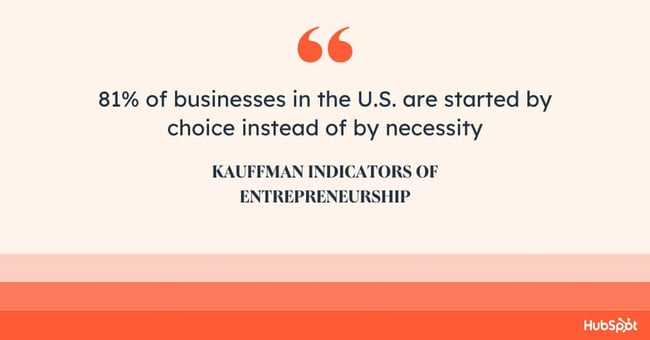
The Global Entrepreneurship Monitor report found that the top four reasons entrepreneurs start businesses are to make a difference in the world, to build great wealth or very high income, to continue a family tradition, and to earn a living because jobs are scarce. Further, 81% of businesses in the U.S. are started by choice instead of by necessity.
Before you embark on entrepreneurship, determine your goals. Is your aim to create career freedom, make a difference in your community, or build wealth for your family (or all the above)?
Knowing your motivations will help you make a plan toward your goals and keep you focused in difficult times.
What makes a successful entrepreneur?
Entrepreneurship is a very individual journey, so there isn't a one-size-fits-all recipe for success. With that said, there are various key traits and best practices most successful entrepreneurs share.
1. Grit
Author Angela Duckworth describes grit as “passion and perseverance for long-term goals,” and has studied how it helps people succeed in competitive environments.
As we already mentioned, the best entrepreneurs are goal-focused. You need to examine your motivations and set goals. More importantly, plot a path for how to reach them. Learn from your mistakes, avoid distractions, and continue through challenges.
2. Future-Thinking
Prior experience — whether from your day job or past startup ventures — can help you succeed as an entrepreneur. Many startup ideas come from experience gained in previous employment. Additionally, industry knowledge and connections can take you far.
When starting a business related to your current work, you also need to check carefully to make sure you don’t violate a non-compete agreement or your employer’s intellectual property.
While industry experience is very helpful, technical knowledge isn’t enough to make someone a successful entrepreneur. As shared in Michael Gerber’s book "The E-Myth," an excellent barista may fail at opening a coffee shop because he or she has no experience hiring employees or marketing a business.
Successful entrepreneurs need to have a broader perspective to create systems to help their business scale and operate without them one day.
3. Decisive
Guy Kawasaki said it well: "Ideas are easy. Implementation is hard."
By executing and being first to the market, you can seize the "first-mover advantage." So, if you're the first to market a good idea, your competition will have to play catch up. Early brand recognition works in your favor and makes it harder for others to replicate your success.
The classic example is Amazon. By the time their success prompted competitors to start their own online bookstores, Amazon had already taken a big enough market share to make competition nearly impossible. Their execution (not just their idea) is what changed the way the world shops.
Successful entrepreneurs aren’t perfect — far from it. They develop the discipline to make decisions despite uncertainty, learn from feedback, and iterate to improve.
4. Embraces Uncertainty and Risk
Starting your own business is a journey into the unknown. To succeed, you need to embrace uncertainty and make decisions in spite of it. Entrepreneurship isn’t for everyone and runs on a high-risk/high-reward system.
Determine whether you have the right traits to launch a business and want to bring this idea to market. (Is it the right time? Do you have the financial security?)
In some cases, it may be better to find a partner or patent and sell your idea. Entrepreneurs need particular traits to succeed like resilience, risk tolerance, and passion.
Risk is not only an essential element of entrepreneurship, but it also tends to be directly related to success: The bigger the risks, the bigger the potential payoff.
5. Learns From Failure
Studies have shown that one of the clearest indicators of future success for an entrepreneur is whether they've experienced failure in the past. This may sound counterintuitive, but not when you think of failure as a teaching tool.
Many of today's tech startups live by the mantra "fail forward." Several businesses that are now household names — like Airbnb and Uber — took multiple launches to succeed.
In the long run, it's better to focus on developing a minimum viable product, launching, and optimizing based on feedback, rather than trying to get it right the first time with an untested idea of a "perfect" product.
How to Become an Entrepreneur
In the U.S., 1 in 278 adults started a business in 2020. Though it’s a common undertaking, no two paths are alike and the process can be overwhelming. Unless you have an entrepreneurship degree, chances are you have little idea how to get started.
One path to entrepreneurship is to purchase an existing business or a franchise, often through a broker. In this case, you will have a partial head start or blueprint for your business, though you will have to go through some of the same steps to register your business and make it your own.
If you’re starting a new business, follow these steps to get started.
How to Start a Business
- Choose a business idea.
- Determine the legal structure of your business.
- Choose and register your business name.
- Secure licenses, permits, and more.
- Establish your mission and vision.
- Write your business plan.
- Write your marketing plan.
- Hire employees.
1. Choose a business idea.
Some entrepreneurs choose to start a business with an idea already in place. For the rest, choosing a business idea can be a challenge.
There’s a huge range from brick-and-mortar establishments to home-based services businesses, business-to-business (B2B), or business-to-consumer (B2C). To find the best fit, ask these questions.
- What interests you? Do you have technical expertise, connections, or experience in a certain industry?
- What problem do you see that you think you can solve?
- Are you more interested in selling a product or a service?
- What competition is out there? Choosing a business in an oversaturated or highly competitive market will make it difficult to penetrate.
- What is likely to turn a profit? Look at examples of similar businesses and research profit margins.
- What is affordable? Opening a restaurant is appealing to many people, but the startup costs are higher than many other business types.
2. Determine the legal structure of your business.
From a legal perspective, what structure will your business be? This may change as you grow, and state laws vary.
Let's take a look at the four major types of legal structures you might choose to implement when starting your business:
- Sole proprietorship. In a sole proprietorship, you are the business as far as laws and taxes are concerned. You're personally liable for debts and losses. However, you can set up a business (DBA) name and a Federal tax ID number to make your business more professional.
- Partnership. A partnership is a single business where at least two people share ownership. Each owner contributes to all aspects of the business as well as shares in its profits and losses.
- LLC. With a limited liability company, you are not personally responsible for any financial or legal faults of the business. Although an LLC is more costly and complex to set up in comparison to some other legal structures, it comes with several tax advantages and protects the owner(s).
- Corporation. A corporation is a legal entity separate from its owners and has most of the rights and responsibilities that an individual possesses (to enter into contracts, loan and borrow money, sue and be sued, hire employees, own assets, and pay taxes).
3. Choose and register your business name.
First, select and register your business name. While this can be fun and creative, it's also a paperwork-heavy legal process with implications for your business down the road.
If you're starting an LLC, your name will be registered automatically when you register your business with the state. Otherwise, you'll need to go through a separate registration process.
Start with a trademark search and then see if your domain name is available. (Tip: You can trademark your name and logo for around $300 in the US.)
4. Secure licenses, permits, and more.
Make sure you have all of the right permits and licenses to make sure your business is operating legally.
If you have a restaurant, for example, you’ll need things like a food service or liquor license. If you sell "tangible property" (i.e., physical items), you’ll need a seller's permit to allow you to collect sales tax from customers.
The IRS can point you to the right office in your state. SBA.gov has tools to help you find out what kind of licenses you'll need to operate your business.
5. Establish your mission and vision.
What does your business do? What do you stand for? How do you plan to make the world better? These are questions your mission and vision statements should answer.
Studies have found that people are four times more likely to buy from a company with a purpose. Your mission and vision should shape your culture and guide every decision you make, from operations to recruitment to marketing. Brands with a strong identity have an easier time producing authentic content true to their values and that resonates with their audiences.
Mission Statement vs. Vision Statement
A mission statement explains the purpose of your organization and how your business serves customers. It typically includes a general description of your organization and its function and objectives.
Your mission statement should clarify the "what," "who," and "why" behind your business.
A vision statement describes the ideal state of the community or world as a result of their contribution.
Learn how to define inspiring vision and mission statements for your business with a free template.
6. Write your business plan.
A business plan is a crucial document to outline what problem you will solve for people, how you will earn a profit, and how you will operate your business. This is a blueprint for success and one you need before asking for funding or a loan for your business.
7. Write your marketing plan.
One part of your business plan is creating a marketing plan. Once you launch a business, it's time to start building an online presence and getting the word out about your brand. Otherwise, you won’t have any customers.
To get started, ask yourself the following questions:
- Who wants or needs what I'm selling?
- Where do they look for information?
- Who might become a promoter of the product I'm selling?
One helpful practice is to create a buyer persona — an in-depth, semi-fictional profile designed to help you better understand the needs of your target customers.
Dig into who your buyer personas are and what messaging would likely resonate best with them. Consider their backgrounds, interests, goals, and challenges as well as their demographics, what they do, and so on.
Document where you plan to reach your customers and a rough budget.
Start outlining your company's marketing strategy.
8. Hire employees.
Unless you can operate your business solo at the start, you need to make your first hire so you can open your doors. Depending on your business, this could be a customer-facing role or could be a specialized role to fill a technical need.
Work with an accountant or human resources firm to set up your payroll and make sure you’re meeting legal requirements as an employer. Research salaries in your area and write up a job description for what you need. Then, post your job on job sites or circulate it to nearby schools.
Look for someone flexible and versatile who aligns with your mission and vision. They’ll likely need to wear lots of hats!
Now that we’ve seen what it takes to become a successful entrepreneur, let’s look at some business ideas.
Entrepreneurship Ideas
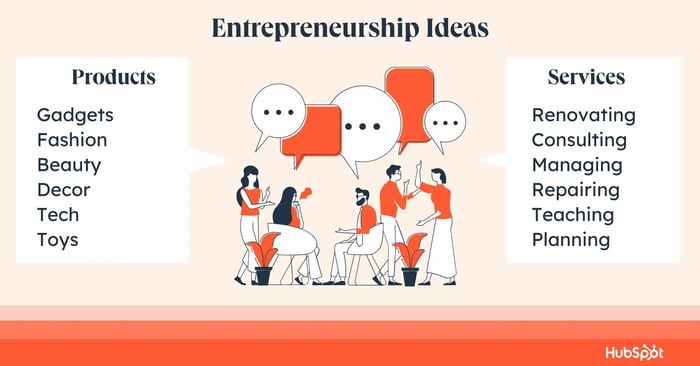
Small business ideas can be divided between offering a product or service. An entrepreneur that sells products is offering tangible objects of various quantities to customers. Ones offering services sell their skills and time to customers continually — like subscriptions.
Business ideas are endless but should be chosen carefully as some markets could be oversaturated with the same offering, or too similar to other previously established businesses. Research your competitors and make the most out of your entrepreneurial journey.
Entrepreneurship Examples
1. Krio Skincare

This Boston business was started by Tony Johnson, an entrepreneur with a passion for hair and skincare. Krio hair sells products for melanated skin made with natural ingredients. The brand also offers hair and lip products.
2. Mindful Training Solutions

Dr. Donald E. Grant Jr. began his consulting business by offering diversity, inclusion, and justice solutions for large businesses. This CEO took his experience from teaching psychology into a way to transform business operations for the better.
3. Otter Public Relations

Scott Bartnick and Jey Feldman joined forces to create a public relations agency to help businesses strengthen their brand reputation. Through a mix of traditional and digital marketing strategies, this agency helps clients increase profitability and credibility.
Examples as inspiring as these are motivating. However, as with all entrepreneurial endeavors, no venture is free from risks. Let’s discuss the different types of risks business owners face.
Entrepreneurship Risks
How much risk you take depends on you, your business, and specific circumstances. For example, buying a domain name doesn't require the same level of commitment as building a prototype.
What matters most is that you grow from your setbacks and maintain a willingness to try new things.
Speaking of risk and failure in entrepreneurship, let's look at some commonly made mistakes and risks for entrepreneurs.
Demand Risk
Are consumers interested in your product or service offering? Demand risk is the prospective customers' willingness to purchase or adopt the offering.
Technology Risk
An entrepreneur assumes technology risk when engineering or scientific research and development are necessary to create the product.
For example, if you plan to create a ground-breaking cure for a disease, you'd assume the risk if the scientific development wasn't successful.
Execution Risk
To be a successful entrepreneur, you also need to be a strong leader. Execution risk is used to describe the entrepreneur's ability to build a strong team of employees and partners to carry out plans.
Financial Risk
Every entrepreneur assumes financial risk, and oftentimes uses personal funds to grow their business. They must operate under the assumption that they'll be able to access external capital from other funding sources (e.g., investors, venture capitalists, crowdfunding).
How to Get Funding for a Business
Starting a business can be expensive. The average small business owner needs around $40,000 in startup capital for their first year. Fortunately, there are plenty of funding options available for entrepreneurial ventures.
If you have valuable ideas and can communicate your vision, you can get startup funding with a little elbow grease. Focus on determining which funding strategy best suits your needs and think about how you can offer value to potential backers.
Bootstrapping
Bootstrapping, or self-funding, has many advantages. It doesn't incur interest and allows you to maintain control over your business and its equity (to name a few).
By self-funding, you don't take any outside funds to grow your business. Bootstrapped businesses keep costs low and scale at a sustainable pace.
We all know the stories of multi-billion dollar companies like Apple that started in a garage or a basement. According to Fundera, 50% of new businesses do the same.
The internet is your friend: Domain names are cheap. Social media offers free marketing. Online retail has a fraction of the overhead of a brick-and-mortar location.
When it comes to generating cash early in the game, look at your business model. Consider pricing in a way that generates revenue in a recurring fashion (i.e., subscriptions over one-off sales).
Small Business Loans and Venture Capital
Traditional small business loans and venture capital funding offer big money…but sometimes with big strings attached.
Small business loans, like from a bank or the SBA, provide an established source of financing that favors more traditional business models. If you go this route, expect to present a meticulous and clear business plan and account for every penny of it.
Venture capital is on the opposite end of the spectrum. VC backers look to put serious cash behind ideas that promise quick and massive growth. Very few have what they're looking for. The ones that do can expect to trade some of their control of the business and a share of its profits in exchange for VC backing.
It's essential to find a backer who shares your vision. With that said, there are some less obvious benefits of equity financing. The process of honing your pitch will reveal areas for improvement in your business model that you might not have otherwise discovered.
Funding is also validating. It means someone is willing to put a dollar amount on how much they believe in what you're doing. And an influx of cash when you're starting out makes all the difference when you need to quickly solidify your first-mover advantage.
Silent Partner
Another option is to work with a silent partner. Similar to a VC backer, this is someone who puts significant funds into your project and expects significant returns. But unlike a VC, a silent partner doesn't want any part in your business decisions.
Because silent partners don't have a say in your business, they're considered investors by the SEC.
Crowdfunding
Crowdfunding sites like Kickstarter and Indiegogo are new sources of funding that have many upsides for entrepreneurs. Crowdfunding provides money without taking equity or autonomy.
These platforms allow you to go straight to your fans and potential users. This promotes future growth and raises capital at the same time.

Crowdfunding sites also serve as marketing platforms. Your content, branding, and mission statement will attract people to your campaign and offerings.
Since you're not giving crowdfunding backers an equity stake or seats on the board, you have to give them something. Campaigns on these platforms tend to offer backers prizes in exchange for their contribution: This can be early access to your product, tickets to a live event, etc.
Here you have another learning opportunity. Designing a crowdfunding campaign forces you to consider the value you're offering your customer.
They say that the best marketing technique is to design an outstanding product. If what you are offering is really of value, your backers will let you know by paying you for it.
Friends and Family
Mom and dad might not have as much money as a venture capital firm or a big bank, but they tend to have much better terms. Family and friends can be a great source of seed money, particularly when you're young and inexperienced.
They're more likely to invest in your potential and your work ethic than a backer who might want to see proof of concept you've yet to produce.
Special Programs
There are entire industries out there — from co-working spaces to CRM software to government grants — dedicated to helping entrepreneurs succeed.
The recent boom in entrepreneurship has sparked competition between governments at local, state, and national levels to attract and foster business development. Business incubators provide essential infrastructure and tools that might otherwise be out of reach for small businesses.
Seed accelerators are highly competitive programs that put startups in head-to-head competition for seed funding. Winners often receive mentorship and educational resources along with financing.
And here at HubSpot, we have a few special programs of our own:
- HubSpot for Startups offers software, education, and support for new and growing businesses.
- HubSpot Academy provides free education in sales, design, marketing, and more.
Entrepreneurship Books
Looking for books to inspire and guide your entrepreneurial efforts? Here are some of the most popular reads:
1. "Tools of Titans" by Tim Ferriss

From the #1 business podcast on iTunes, learn the tools, tactics, and morning routines of 200 of the world's top performers. This book covers topics ranging from tech to powerlifting to special operations and the music industry.
2. "Influence" by Robert Cialdini

Based on 35 years of research, "Influence" breaks down the psychology of persuasion into six key principles. This is a must-read for anyone interested in hearing the word "yes" more often.
3. "The Lean Startup" by Eric Ries
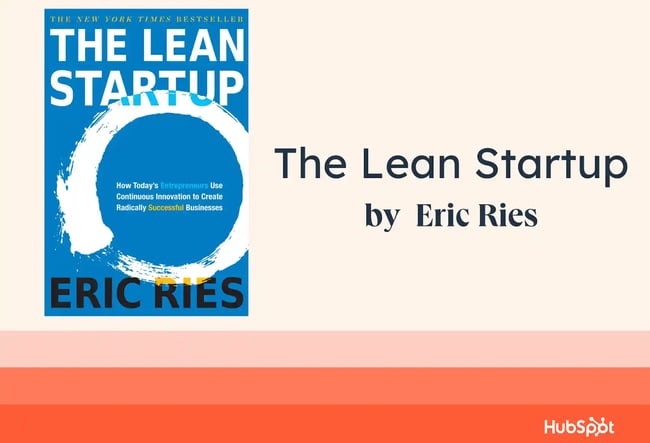
This book offers a blueprint for the modern startup and a survival manual for a business environment where failure is common. Learn how to innovate rapidly, put ideas to the test, and operate in the "extreme uncertainty" that is the startup ecosystem.
4. "Idea to Execution" by Ari Meisel and Nick Sonnenberg
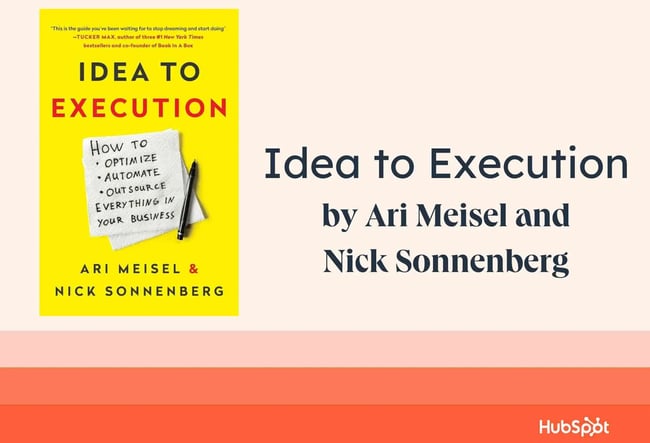
Find out how to optimize, automate, and outsource everything in your business. Meisel and Sonnenberg use the process outlined in this book to take a business from an idea on a cocktail napkin to a 24-hour launch.
5. "Pivot" by Jenny Blake

Pivoting is the act of taking your existing strengths in a new direction. It's about maximizing the opportunity presented by the question, "What's next?" Blake explores the value of pivoting in business and your career.
6. "Built to Last: Successful Habits of Visionary Companies" by Jim Collins

Get case studies of businesses that have stood the test of time. "Built to Last" breaks down the structural secrets to organizational longevity. This is an inspiration for anyone hoping to leave a legacy in business.
7. "Smarter, Faster, Cheaper" by David Siteman Garland

This book offers a guide to marketing for entrepreneurs in the digital age. Garland includes practical advice to make the most of online marketing tools and platforms.
Entrepreneurship Quotes
- A year from now you will wish you had started today. — Karen Lamb
- Success is not the key to happiness. Happiness is the key to success. If you love what you are doing, you will be successful. — Albert Schweitzer
- Dream big. Start small. But most of all, start. — Simon Sinek
- Be patient with yourself. Self-growth is tender, it's holy ground. There's no greater investment. — Stephen Covey
- My best advice to entrepreneurs is this: Forget about making mistakes, just do it. — Ajaero Tony Martins
- Ambition is the steam that drives men forward on the road to success. Only the engine under full steam can make the grade. — Maxi Foreman
- The only way to do great work is to love what you do. — Steve Jobs
- The best way to predict the future is to create it. — Peter Drucker
- One of the huge mistakes people make is that they try to force an interest on themselves. You don't choose your passions; your passions choose you. — Jeff Bezos
- Ambition is the steam that drives men forward on the road to success. Only the engine under full steam can make the grade. — Maxi Foreman
- Waiting for perfect is never as smart as making progress. — Seth Godin
- Entrepreneurship is at the core of the American dream. It's about blazing new trails, about believing in yourself, your mission, and inspiring others to join you in the journey. What sets [entrepreneurs] apart is the will, courage and sometimes recklessness to actually do it. — Derek Hutson
Taking the First Step to Become an Entrepreneur
Entrepreneurship is a learning process and a journey of discovery. You don't need to know everything to take the first small step, and when starting your own business, the best way to learn is by doing.
You have the tools and information you need to start — all that's left to do is to get to work.







![How to Start a Business: A Startup Guide for Entrepreneurs [Template]](https://blog.hubspot.com/hubfs/How-to-Start-a-Business-Aug-11-2023-10-39-02-4844-PM.jpg)

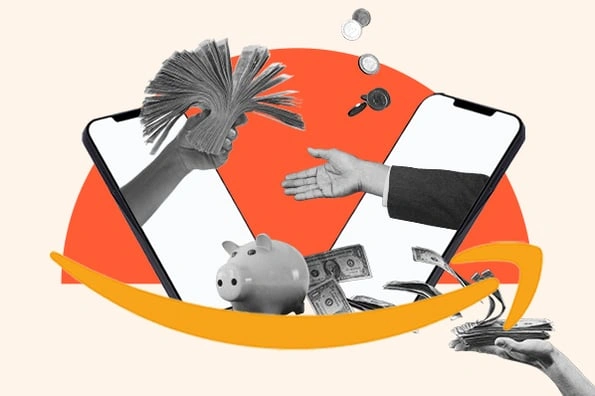
![How to Write a Business Proposal [Examples + Template]](https://blog.hubspot.com/hubfs/how-to-write-business-proposal%20%281%29.webp)



